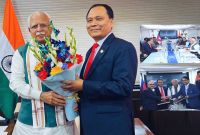Suspicion Turns to Defiance: How South Korea–China Ties Unravelled

For years, South Korea and China maintained a pragmatic partnership rooted in trade. Beijing became Seoul’s top trading partner, while Korean brands from electronics to K-pop thrived in Chinese markets. Officially, it was hailed as regional cooperation. Unofficially, mistrust brewed.
That mistrust deepened as South Korean intelligence flagged covert Chinese influence operations: funding political campaigns, shaping media narratives, and infiltrating civic groups. Though dismissed as isolated incidents, analysts warned of a broader strategy to sway Seoul’s policies toward Beijing.
Public alarm surged after key elections were marred by disinformation traced to China-linked networks. Social media buzzed with divisive posts targeting anti-Beijing candidates. While direct interference remained unproven, the perception of meddling stuck.
Then came reports of Chinese “police stations” disguised as cultural centres in Seoul allegedly monitoring nationals and harassing dissidents. The public saw them as violations of sovereignty. Viral videos of Chinese tourists vandalizing heritage sites and clashing with locals only stoked resentment.
By the time mass protests erupted outside the Chinese embassy, the grievances had fused into a single narrative: China was no longer just a trade partner it was an intrusive force threatening South Korea’s democracy and independence.
The protests, once small, have swelled into daily demonstrations. Banners read “Hands off our democracy,” while mock trials of Chinese officials play out in the streets. Viral incidents like a Chinese tourist assaulting a taxi driver have become rallying points.
The government walks a diplomatic tightrope: pledging investigations without directly accusing Beijing. Behind closed doors, Chinese envoys have lodged formal complaints, demanding protection and media restraint.
Security has intensified. Concrete barriers ring the embassy, drones monitor the skies, and police patrols have expanded nationwide. International media from Tokyo to Toronto frame the unrest as part of a broader backlash against CCP influence.
Beijing, meanwhile, blames “external forces” and warns of lasting damage to bilateral ties. But the protests show no signs of slowing. Organizers plan a nationwide day of action, demanding investigations, closures of unauthorized Chinese outposts, and a foreign policy reset.What began as quiet suspicion has become a national reckoning with global implications.
South Korea’s escalating protests against China are driven by three converging concerns: political interference, cultural friction, and covert influence operations. Allegations of Chinese meddling in domestic politics via disinformation campaigns, covert funding, and media manipulation have circulated for years. Recent intelligence reports suggest coordinated online efforts to promote pro-Beijing narratives and discredit critics. While hard evidence remains scarce, public perception has hardened. For many South Koreans, foreign interference threatens the integrity of their democracy.
Cultural clashes have further inflamed tensions. Viral incidents involving Chinese tourists vandalizing heritage sites, clashing with locals, or flouting public norms are widely shared and interpreted as symbolic of broader disrespect. Though not representative of all Chinese nationals, these episodes feed a growing belief that Beijing operates in South Korea with disregard for local laws and customs. The government’s perceived reluctance to hold offenders accountable only deepens public frustration.
The discovery of alleged Chinese “police stations” operating unofficially in Seoul has added a new layer of concern. These facilities, reportedly linked to the CCP, are accused of monitoring Chinese nationals and pressuring dissidents raising alarms about sovereignty violations. Similar operations uncovered in other countries have made this a global issue, reinforcing fears that China’s influence is not just political or economic, but physical and territorial.
Together, these factors have catalysed a national movement. What began as isolated protests has evolved into mainstream resistance, reshaping public opinion and political discourse. Trust in China has plummeted, economic ties are fraying, and diplomatic engagements are strained. Chinese nationals in South Korea face growing hostility, while Korean citizens with ties to China find themselves caught in a widening social divide.
Unless addressed through transparency and recalibrated diplomacy, these fractures may outlast the protests leaving behind a legacy of mistrust and regional instability.
Beijing’s reach into South Korea’s politics, culture, and civil society has sparked mass protests and deep public unease. Allegations of interference, covert policing, and cultural disrespect have eroded trust. The question now is urgent: will Seoul confront these intrusions head-on, or allow economic ties to mute its response? Without decisive action, South Korea risks becoming a case study in compromised sovereignty. Can a democracy defend itself when the threat wears the mask of partnership? The world is watching.




![From Kathmandu to the World: How Excel Students Are Winning Big [Admission Open]](https://nepalaaja.com/img/70194/medium/excel-college-info-eng-nep-2342.jpg)
